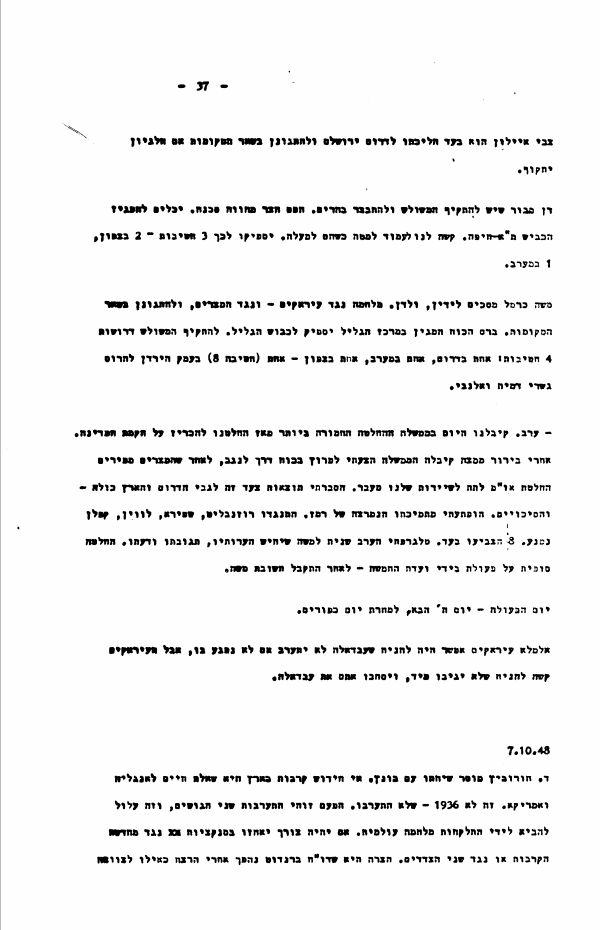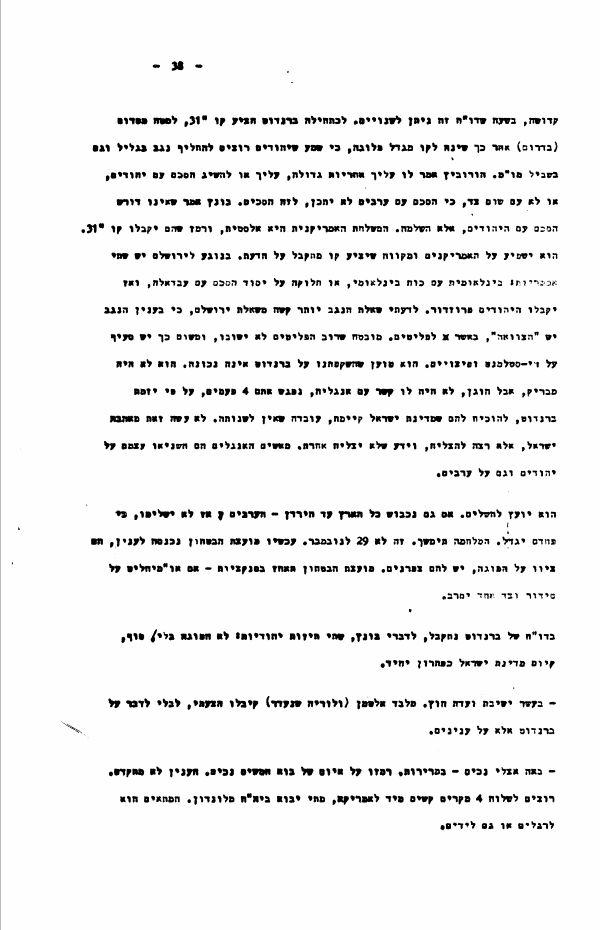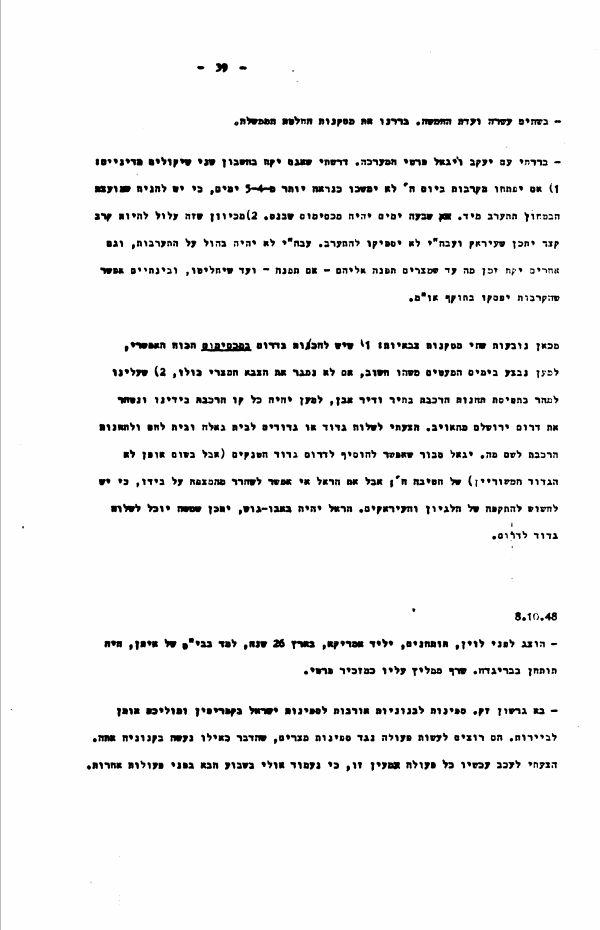1
of
Places:
England
United States
Migdal
Bethlehem
London
Egypt
Har'el
Spain
Jerusalem
Abu Ghosh
The use of the photograph is subject to the Copyright Law, 2007
06.10.1948
224877
[Thursday,] October 7, 1948 D. [David] Horowitz reports on his conversation with [Ralph] Bunche [the new UN mediator]: non-resumption of hostilities in the country is a vital issue for England and America. This is not 1936 – when they did not intervene [in Franco’s revolt in Spain]. This time there’s intervention by two blocs, and this could lead to escalation to a global war. If necessary, they’ll adopt sanctions against the re-instigator of hostilities or against both sides. The problem is that since his assassination, Bernadotte’s report has become a sacred will of sorts, at a time when this report should be subject to change. At the outset Bernadotte proposed a 31” [wide] line, down from Sdom (in the south), then changed it to the Majdal-Faluja line, because he heard that the Jews wanted to exchange the Negev for the Galilee, and also for negotiations. Horowitz told him [Bunche]: You have a great responsibility, you must either reach an agreement with Jews or with neither side, because an agreement with Arabs is not feasible. He agreed with this. Bunche said that he isn’t demanding an agreement with the Jews, but rather peacemaking. The American delegation is flexible, and he implied that they’d accept a 31” line. He’ll exert influence on the Americans, and he hopes to propose an acceptable line. Regarding Jerusalem there are two possibilities: an international [enclave] with an international force, or partition based on an agreement with Abdallah, and then the Jews will receive a corridor. In his opinion the question of the Negev is tougher than the question of Jerusalem, because in the matter of the Negev there’s the “will.” As to refugees, it’s assured that most of the refugees won’t return, and therefore there is a provision on resettlement [in Arab countries] and compensation. He claims that our view of Bernadotte is incorrect. He wasn’t brilliant, but was fair. He didn’t have a connection with England. [Bunche himself] met with them four times, at Bernadotte’s initiative, to prove to them that the State of Israel exists, a fact that cannot be changed. [Bernadotte] didn’t do this out of love for Israel, but because he wanted to succeed, and he knew that he wouldn’t succeed otherwise. [Bunche] blames the English: they made themselves hateful to the Jews and also to the Arabs. He advises [that we] accept the situation. Even if we conquer the entire country up to the Jordan – the Arabs won’t make peace, because their fear will increase. The war will continue. This is not November 29. Now the Security Council has entered the picture, they’ve ordered a truce, they have claws. The Security Council will adopt sanctions – if the UN decides on an arrangement and one side refuses. Bernadotte’s report, according to Bunche, has two Jewish themes: no indefinite truce; the existence of the State of Israel as the only solution. – At ten Foreign Affairs Committee meeting. Aside from [Dr. Aryeh] Altman (and [Zvi] Lurie who was absent) they accepted my proposal, without discussing [the] Bernadotte [report] but rather the issues. – [A delegation of] disabled persons came to see me – with bitterness. They hinted at the threat of 50 disabled coming [to demonstrate]. There’s no progress on the issue. They want to send four difficult cases to America immediately. When will the [prosthetics] factory arrive from London? Is it set up for [manufacturing just] legs or also arms? – At twelve the Committee of Five. We examined the conclusions of the government decision. – With Ya’akov [Dori] and Yigael [Yadin] I examined the details of the battle plan. I demanded that the Operations Department take two political considerations into account: 1) If hostilities begin on Thursday [October 14], they probably won’t continue more than 4-5 days, because presumably the Security Council will intervene immediately. Seven days will be the maximum, by miracle. 2) Because this might be a short battle, it’s possible that Iraq and Transjordan won’t have time to get involved [as opposed to the previous operation]. Transjordan won’t be rushing to intervene, nor will others. It will take some time for Egypt to approach them – if it does approach – and for them to decide, and in the meantime the hostilities might come to an end under the authority of the UN. Two military conclusions follow from this: 1) It’s necessary to strike in the south with the maximum possible force, so as to achieve something significant within the few days [available], if we don’t defeat the entire Egyptian army. 2) We must be quick about seizing the train stations at Battir [Beitar] and Deir Aban, so that the entire railway is in our hands and we cleanse southern Jerusalem of the enemy. I proposed sending a battalion or battalions to Beit Jala and Bethlehem and the train stations for this purpose. Yigael [Yadin] thinks that the tank battalion [Battalion 82] of Brigade Het [the 8th Brigade] can be added to the south (but absolutely not the armored battalion [Battalion 89, the Commando]); but Harel cannot be released from the lookout on Biddu [the northern part of the corridor], because [we] should be concerned about an attack by the Legion and the Iraqis. Harel will be in Abu Ghosh. Moshe [Dayan] might be able to send the battalion to the south.











